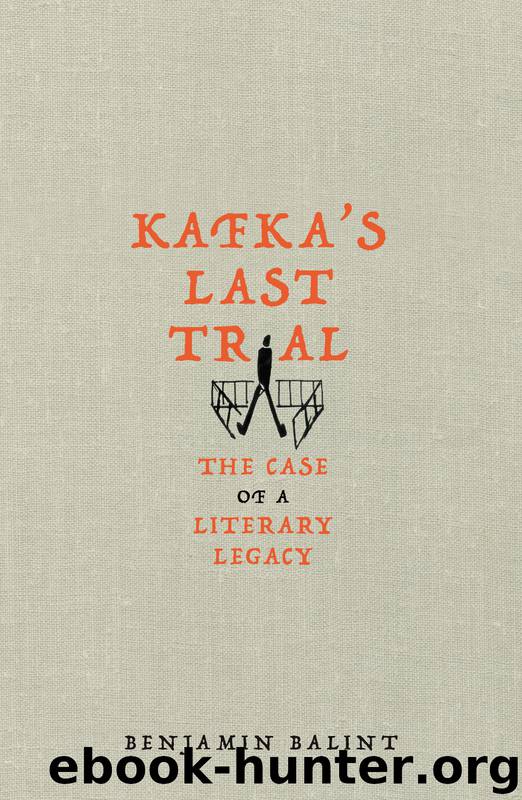Kafka's Last Trial by Benjamin Balint

Author:Benjamin Balint
Language: eng
Format: epub, mobi
Publisher: Pan Macmillan UK
During the trial in Israel, Germans regarded Israelis as latecomers to Kafka studies. But in another sense the Germans themselves were burdened by belatedness. From World War II until the 1980s, Kafka’s Jewishness was virtually ignored in Germany. Günther Anders, writing in German in 1951, offers a representative example: “To claim Kafka as the continuator of the Jewish religion and Jewish theology is completely and absolutely off the mark.”
The first German conference to address Kafka’s Jewishness was convened by Karl Erich Grözinger and Hans Dieter Zimmermann in Frankfurt in 1986. The Stuttgart-born scholar Grözinger (b. 1942) argued, as he would subsequently put it in his book Kafka and Kabbalah, “whenever Kafka speaks of judgment, sin, atonement and justification, he is working from the direct context of a Jewish theology.” Grözinger tells me that many leading German scholars, including Hartmut Binder, declined to come to the groundbreaking conference. Those who did attend were dismayed by what they heard. “They acknowledged that Kafka was a Jew, but didn’t know how to interpret his Jewishness,” Grözinger says, “and resisted the notion that the great German writer would be snatched from their hands.” It was as though they feared Kafka would be Judaized or “Jewified.”
German literary critics have worked assiduously to rehabilitate Kafka and claim him as their own. In his monumental studies published in 1958 (Franz Kafka and Die Weltkritik von Franz Kafka), Wilhelm Emrich argued that Kafka completed German classicism, and “poetically renewed the classical legacy of German humanism that he adored and honored throughout his life.” Beginning in the 1960s, a popular edition of Kafka’s stories (Sämtliche Erzählungen, edited by Paul Raabe) sold a million copies in Germany.
Today, the German weekly Die Zeit publishes a supplement on the history of German literature for high school students, divided into the standard periods: Middle Ages, Baroque (1600 to 1720), Enlightenment (1680 to 1789), Sturm und Drang (late 1760s to early 1780s), Weimar Classicism (1772 to 1805), Romanticism (1790s to 1880s), Biedermeier (1815 to 1848), and so forth. Only one writer merits his own category. In between Moderne and Expressionismus, Kafka perches permanently in the German canon.
Kafka once said that Jews and Germans “have a lot in common. They are ambitious, able, diligent, and thoroughly hated by others. Both are pariahs.” And yet Kafka almost never mentions Germany in his letters or diaries, and when he does it is with indifference. Although he briefly lived in Berlin with Dora Diamant, and although all his publishers were in Germany, Kafka was neither German nor non-German. “I have never lived among German people,” Kafka remarked to Milena Jesenská. (Of the correspondence with Milena, only Kafka’s letters to her remain. She gave them to their mutual friend Willy Haas in 1939, shortly before the Gestapo arrested her and deported her to the Ravensbrück concentration camp. Shortly after Kafka’s death, she had asked Brod to burn her letters to Kafka.) “Kafka wrote in German, of course,” Philip Roth notes, “but he was not a German in any way. He was, to the core, a German-speaking citizen of Prague and a son of Prague Jews.
Download
This site does not store any files on its server. We only index and link to content provided by other sites. Please contact the content providers to delete copyright contents if any and email us, we'll remove relevant links or contents immediately.
Steroids: History, Science, and Issues by Standora Joan E.; Bogomolnik Alex; Slugocki Malgorzata(1192)
A Practical Guide to International Arbitration in London by Hilary Heilbron(1081)
Adrift by Steven Callahan(1029)
Reclaiming History by Vincent Bugliosi(1018)
Persuasion by Owner(1011)
The Nuremberg Interviews by Leon Goldensohn(988)
Dog Company: A True Story of American Soldiers Abandoned by Their High Command by Lynn Vincent & Roger Hill(978)
40 Days and 40 Nights by Matthew Chapman(966)
Poisoned by Jeff Benedict(958)
Last Narco by Beith Malcolm(935)
The New Whistleblower's Handbook by Stephen Kohn(921)
Introduction to the study and practice of law in a nutshell by Kenney F. Hegland(894)
Kafka's Last Trial by Benjamin Balint(845)
Lincoln's Code by John Fabian Witt(840)
A Passing Fury by A. T. Williams(825)
Japanese War Crimes during World War II: Atrocity and the Psychology of Collective Violence by Frank Jacob(808)
Eichmann in Jerusalem by Hannah Arendt(797)
Dog Company: A True Story of American Soldiers Abandoned by Their High Command by Roger Hill & Lynn Vincent(794)
A Court of Refuge by Ginger Lerner-Wren & Rebecca A. Eckland(785)
